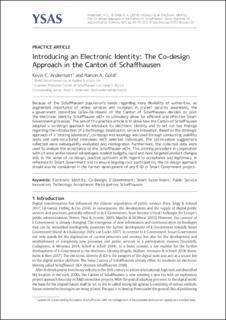Please use this identifier to cite or link to this item:
https://doi.org/10.21256/zhaw-24529| Publication type: | Article in scientific journal |
| Type of review: | Peer review (publication) |
| Title: | Introducing an electronic identity : the co-design approach in the Canton of Schaffhausen |
| Authors: | Andermatt, Kevin C. Göldi, Ramon A. |
| et. al: | No |
| DOI: | 10.5334/ssas.122 10.21256/zhaw-24529 |
| Published in: | Swiss Yearbook of Administrative Sciences |
| Volume(Issue): | 9 |
| Issue: | 1 |
| Page(s): | 41 |
| Pages to: | 50 |
| Issue Date: | 2018 |
| Publisher / Ed. Institution: | Ubiquity Press |
| ISSN: | 2632-9255 |
| Language: | English |
| Subjects: | Co-design; Electronic identity; Participation; Public service innovation; E-Government; Smart Government; Technology acceptance |
| Subject (DDC): | 350: Public administration |
| Abstract: | Because of the Schaffhausen population’s needs regarding more flexibility of authorities, an augmented importance of online services and increases in (cyber) security awareness, the e-government committee (eGov-Kernteam) of the Canton of Schaffhausen decided to pilot the electronic identity Schaffhauser eID+ to ultimately allow for efficient and effective Smart Government processes.* The aim of this practice article is to show how the Canton of Schaffhausen adopted a co-design approach to introduce its electronic identity and to set out key findings regarding the introduction of a technology-based public service innovation. Based on the strategic approach of a ‘testing laboratory’, co-design methodology was used through conducting usability tests and semi-structured interviews with selected individuals. The optimization suggestions collected were subsequently evaluated and reintegrated. Furthermore, the collected data were used to analyze the acceptance of the Schaffhauser eID+. This piloting procedure in cooperation with citizens unites several advantages: modest budgets, rapid and more targeted product changes and, in the sense of co-design, positive spillovers with regard to acceptance and legitimacy. In reference to Smart Government and to ensure ongoing civic participation, the co-design approach should also be considered in the further development of any E-ID or Smart Government project. |
| URI: | https://digitalcollection.zhaw.ch/handle/11475/24529 |
| Fulltext version: | Published version |
| License (according to publishing contract): | CC BY 4.0: Attribution 4.0 International |
| Departement: | School of Management and Law |
| Organisational Unit: | Institute of Public Management (IVM) |
| Appears in collections: | Publikationen School of Management and Law |
Files in This Item:
| File | Description | Size | Format | |
|---|---|---|---|---|
| 2018_Andermatt-etal_Electronic-identity-Co-design-approach-SH.pdf | 1.28 MB | Adobe PDF |  View/Open |
Show full item record
Andermatt, K. C., & Göldi, R. A. (2018). Introducing an electronic identity : the co-design approach in the Canton of Schaffhausen. Swiss Yearbook of Administrative Sciences, 9(1), 41–50. https://doi.org/10.5334/ssas.122
Andermatt, K.C. and Göldi, R.A. (2018) ‘Introducing an electronic identity : the co-design approach in the Canton of Schaffhausen’, Swiss Yearbook of Administrative Sciences, 9(1), pp. 41–50. Available at: https://doi.org/10.5334/ssas.122.
K. C. Andermatt and R. A. Göldi, “Introducing an electronic identity : the co-design approach in the Canton of Schaffhausen,” Swiss Yearbook of Administrative Sciences, vol. 9, no. 1, pp. 41–50, 2018, doi: 10.5334/ssas.122.
ANDERMATT, Kevin C. und Ramon A. GÖLDI, 2018. Introducing an electronic identity : the co-design approach in the Canton of Schaffhausen. Swiss Yearbook of Administrative Sciences. 2018. Bd. 9, Nr. 1, S. 41–50. DOI 10.5334/ssas.122
Andermatt, Kevin C., and Ramon A. Göldi. 2018. “Introducing an Electronic Identity : The Co-Design Approach in the Canton of Schaffhausen.” Swiss Yearbook of Administrative Sciences 9 (1): 41–50. https://doi.org/10.5334/ssas.122.
Andermatt, Kevin C., and Ramon A. Göldi. “Introducing an Electronic Identity : The Co-Design Approach in the Canton of Schaffhausen.” Swiss Yearbook of Administrative Sciences, vol. 9, no. 1, 2018, pp. 41–50, https://doi.org/10.5334/ssas.122.
Items in DSpace are protected by copyright, with all rights reserved, unless otherwise indicated.